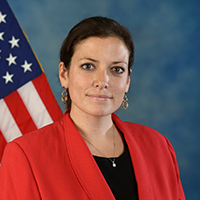Doctor of Liberal Studies
Jennifer Phillips

Not so long ago, the highlights of Jennifer Phillips’ week were the two nights she would drive more than 35 miles from Fort Meade, Maryland, where she was stationed, to her classes at Georgetown.
“What I looked forward to all week where those two days that I had class,” said Phillips, a Major in the Air Force Reserves, who received a Doctor of Liberal Studies degree in 2016. “I looked forward to that environment and the interactions in class.”
And what did that experience teach her? Perhaps, most important, said Phillips, an expert in military intelligence and support who has an MBA in management, was—well, how much she didn’t know.
“It’s a really humbling experience,” she said.
And an immensely valuable one. In fact, it’s a good bet that Phillips could not have written her dissertation, “Hermeneutic Inquiry and Just War Theory: Finding Meaning in Post-War Society,” without looking skeptically at the whole idea of “knowing” and truth—concepts some philosophers say are incomplete and mediated by our own personal and cultural narratives.
If this sounds theoretical, consider that Phillips applied her analysis to a critical, real-world dilemma: how to achieve real peace in post-2001 Afghanistan.
“How do we achieve order and justice in a society postbellum when the yardstick for measuring order and justice appears indeterminate and variable? …” she wrote. “Often, programs designed to achieve peace and security can be perceived by the affected population as inconsistent with social, religious, or cultural worldviews.”
Phillips applies the insights she gained from her dissertation, and her experience at Georgetown, to her job at USAID’s Office of U.S. Foreign Disaster Assistance (OFDA), which leads and coordinates the U.S. government’s humanitarian assistance efforts overseas. She is currently a Humanitarian Assistance Advisor to the U.S. military and has deployed on a number of disaster responses including the 2016 Ecuador earthquake and the USG response to Ebola in West Africa. She said the program helped her “see the value in different disciplines and domains that might not normally be associated with a given topic.”
“It really opened up the aperture of possibilities.”